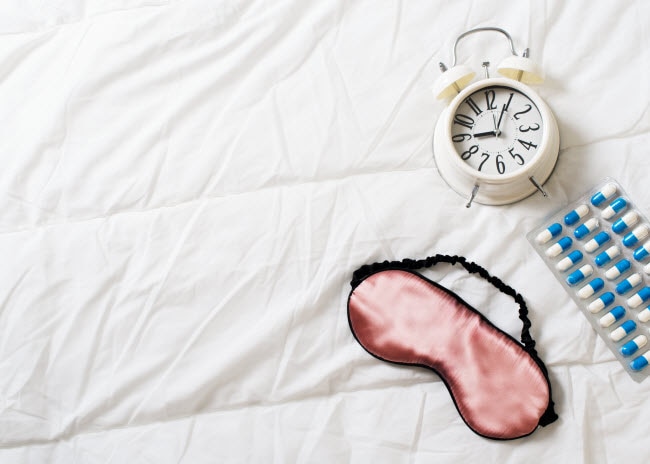As mounting research points to the significance of sound sleep, more and more people are searching for natural ways to score the 7-9 hours they indisputably need.
With this has arrived a spike in melatonin supplement sales. According to the National Center for Complementary and Integrative Health (NCCIH), melatonin use among American adults has more than doubled since 2007, with 1.3 percent of the population—or 3.1 million people—calling upon the supplement to help them fall asleep. Naturally produced in your pineal gland (which is located right above the middle of your brain), the hormone decreases alertness and aids in rest. At the same time, melatonin is a powerful antioxidant that can serve a protective role in the body.
And yet, age, insomnia, working the graveyard shift, and long flights can all affect melatonin levels, rendering the increased desire for it in supplement form all the more understandable.
But as natural as melatonin may be, it doesn’t always arrive without consequence. In addition to drowsiness and headaches, melatonin can trigger several side effects. Here are the possible impacts it may cause—and the alternatives you might try before hitting the (supplement) bottle.
6 Possible Melatonin Side Effects
1. Short-term feelings of depression
While multiple, reputable sources, including the FDA, agree that melatonin is generally safe for temporary use, one of its lesser-known side effects is short-term feelings of depression. On an intuitive level, this makes sense: Melatonin diminishes energy and may lead to lethargy, which are common symptoms of depression. And while the link between melatonin and depression isn’t fully understood yet, it “can make symptoms of depression worse,” WebMD reports. (If you’re currently being treated for depression and taking medication, it’s vital to consult with your physician before taking melatonin, as it may interact with certain medications.)†
Try this instead: Bed down with a lavender pillow—or take a whiff of the fragrant herb before you hit the sheets. According to a 2016 study published in the journal Explore, college students who “inhaled a lavender-scented patch before bed reported better nighttime sleep and more daytime energy, compared to those who inhaled a placebo patch,” Time reports.
2. Mood changes
Melatonin may also lead to mood changes that could affect your waking hours. According to Mental Health America, “mood changes have been reported, both highs and lows, and even psychotic symptoms such as paranoia and hallucinations.” Additionally, the NCCIH says that according to one study, “researchers noted that melatonin supplements may worsen mood in people with dementia.”†
Try this instead: A noise machine. Sounds from nature—whether it’s lulling waves or a rainforest—can provoke a relaxation response in the brain, thereby urging you closer and closer to the serene state that’s needed for sleep.
3. Gastric distress
Insomnia and now…intestinal aches? Possibly. Mental Health America reports that the most common side effect of melatonin is gastric distress. The most frequent complaints are nausea, vomiting, and/or stomach cramps.†
Try this instead: A mug of warm milk with honey. Milk contains the sleep-inducing amino acid tryptophan, while honey helps the amino acid work faster.
4. Daytime sleepiness
While the intended function of melatonin is, of course, increased sleepiness, experiencing drowsiness during the day can wreak havoc on your mood, plans, and ability to function optimally. Even if you take melatonin at night—when it’s typically recommended—you may have what’s called “reduced melatonin clearance rates,” or the pace at which melatonin is removed from the body. (This is seen with greater frequency in children and the elderly.)†
Try this instead: Exercise. A run right before bedtime will likely leave you amped up, but gentle exercises that naturally promote relaxation—such as yoga, stretching, and tai chi—can reduce anxiety, quiet the chatter in your mind, and help prepare you for a full night of zzzzs.
5. Decreased body temperature
The National Institutes of Health indicates that melatonin may also lower your body’s core temperature. While this may be desired by some—especially those who feel too hot to sleep—it may be a problem for those who have trouble staying warm.†
Try this instead: Hide your electronics. You might mute your phone or iPad, but the glowing screen that appears when a text, email, or update arrives is bound to make a night of tossing and turning worse. Keep your devices in another room, call upon an old-school alarm clock to rise the next day, or use the Bedtime app on your iPhone, which will keep interruptions away.
6. Reproductive system
The link between melatonin and reproductive systems is not entirely understood—yet—but because it does impact this area of your body, breastfeeding moms (and those who wish to get pregnant) are advised to eschew melatonin supplements altogether.†
Try this instead: Brew a mug of valerian tea. In a study out of Norway, it was found that the herbal tea helped roughly one in 13 insomniacs fall—and stay—asleep. Chamomile, lemon balm, magnolia, and that aforementioned lavender (albeit in a different form) can also do the trick.
Bottom line: While rare, melatonin may result in one or a number of side effects, and should only be used for short-term relief and under your doctor’s supervision. Should you and your physician decide that it’s a wise option, consider going with Vitacost's Melatonin Plus Theanine. The sleep and stress-support formula combines melatonin with that L-theanine we mentioned earlier, giving you natural aid for relaxation and sounder, deeper sleep. A better night’s rest is in your future—and now you have the power to harness it.†
†These statements have not been approved by the Food and Drug Administration. These products are not intended to diagnose, treat, cure or prevent disease.




